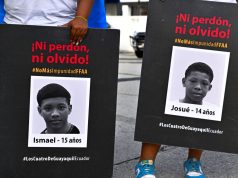Moldova’s president has accused “criminal groups” of undermining a referendum on European Union membership.
The EU referendum asked voters to choose whether to enshrine in the country’s constitution a path toward the EU.
After around 95% of votes were counted, approximately 52% voted no, while 47% voted yes.
However, ballots cast among the country’s large ex-pat population are still being counted.
“Criminal groups, working together with foreign forces hostile to our national interests, have attacked our country with tens of millions of euros, lies and propaganda, using the most disgraceful means to keep our citizens and our nation trapped in uncertainty and instability,” said president Maia Sandu.
“We have clear evidence that these criminal groups aimed to buy 300,000 votes – a fraud of unprecedented scale.
“Their objective was to undermine a democratic process.”
Polls by WatchDog, a Chisinau-based thinktank, show a clear majority of more than 50% support the EU path.
Voters were also taking part in the first round of a presidential race.
If Ms Sandu fails to win an outright majority, a run-off will be held on 3 November which could pit her against Alexandr Stoianoglo, a Russia-friendly former prosecutor general who is polling at around 10%.
The two ballots are being held amid ongoing claims by Moldovan authorities that Moscow has intensified an alleged “hybrid war” campaign to destabilise the country and derail its EU path.
The allegations include funding pro-Moscow opposition groups, spreading disinformation, meddling in local elections, and backing a major vote-buying scheme.
Read more:
Moldovans divided over EU referendum
US national security spokesman John Kirby echoed those concerns this week, saying in a statement that “Russia is working actively to undermine Moldova’s election and its European integration”. Moscow has repeatedly denied it is interfering in Moldova.
“In the last several months, Moscow has dedicated millions of dollars to influencing Moldova’s presidential election,” Mr Kirby said.
In early October, Moldovan law enforcement said it had uncovered a massive vote-buying scheme orchestrated by Ilan Shor, an exiled pro-Russia oligarch who currently resides in Russia, which paid €15m (£12.5m) to 130,000 individuals to undermine the two ballots.
Mr Shor, who was sentenced in his absence last year to 15 years in jail for fraud and money laundering in the case of $1bn (£766m) that went missing from Moldovan banks in 2014, denied the allegations, saying “the payments are legal” and cited a right to freedom of expression.
Moldova, a former Soviet republic with a population of about 2.5 million, applied to join the EU in the wake of Russia’s full-scale invasion of Ukraine, and was granted candidate status that summer, alongside Ukraine.
Brussels agreed in June to start membership negotiations.



















